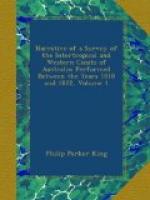(Footnote. The natives of Hanover Bay, with whom we communicated, were not deprived of their front teeth, and wore their beards long; they also differed from the above description in having their hair long and curly. Dampier may have been deceived in this respect, and from the use that they make of their hair, by twisting it up into a substitute for thread, they had probably cut it off close, which would give them the appearance of having woolly hair like the negro.)
“They have no sort of clothes, but a piece of the rind of a tree tied like a girdle about their waists, and a handful of long grass, or three or four small green boughs full of leaves, thrust under their girdle, to cover their nakedness.
“They have no houses, but lie in the open air without any covering; the earth being their bed, and the heaven their canopy. Whether they cohabit one man to one woman, or promiscuously, I know not; but they do live in companies, twenty or thirty men, women, and children together. Their only food is a small sort of fish, which they get by making weirs of stone across little coves or branches of the sea; every tide bringing in the small fish, the there leaving them for a prey to these people, who constantly attend there to search for them at low water. This small fry I take to be the top of their fishery: they have no instruments to catch great fish, should they come; and such seldom stay to be left behind at low water: nor could we catch any fish with our hooks and lines all the while we lay there. In other places at low water they seek for cockles, mussels, and periwinkles. Of these shell-fish there are fewer still; so that their chief dependence is upon what the sea leaves in their wares; which, be it much or little, they gather up, and march to the places of their abode. There the old people that are not able to stir abroad by reason of their age, and the tender infants, wait their return; and what Providence has bestowed on them, they presently broil on the coals, and eat it in common. Sometimes they get as many fish as makes them a plentiful banquet; and at other times they scarce get every one a taste; but be it little or much that they get, every one has his part, as well the young and tender, the old and feeble, who are not able to go abroad, as the strong and lusty. When they have eaten they lie down till the next low water, and then all that are able march out, be it night or day, rain or shine, ’tis all one; they must attend the weirs, or else they must fast; for the earth affords them no food at all. There is neither herb, root, pulse, nor any sort of grain for them to eat, that we saw; nor any sort of bird or beast that they can catch, having no instruments wherewithal to do so.




